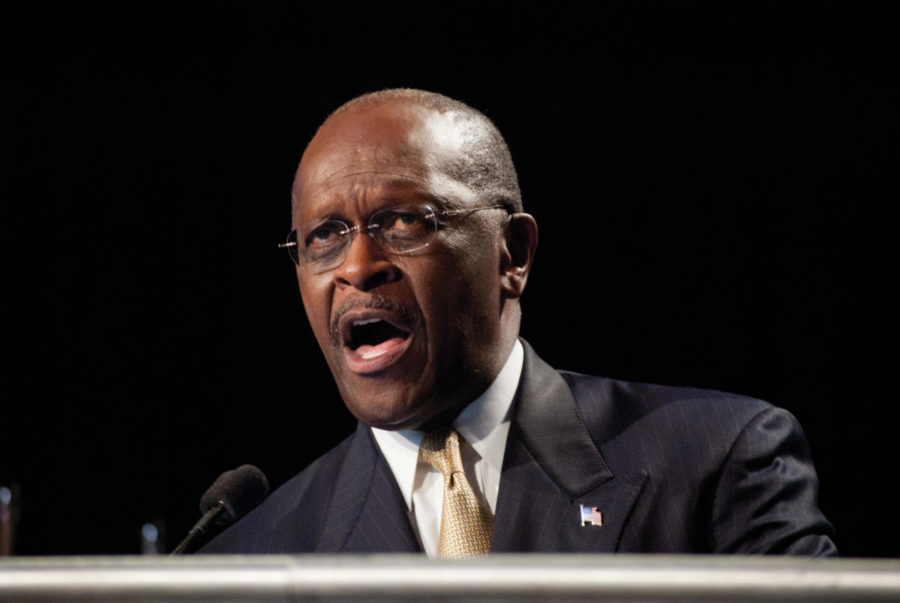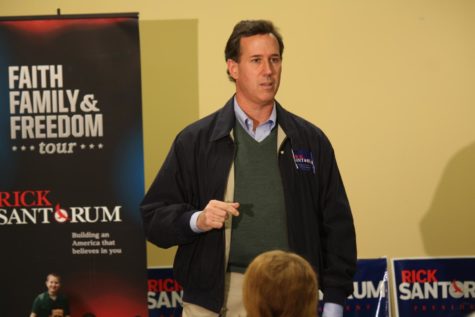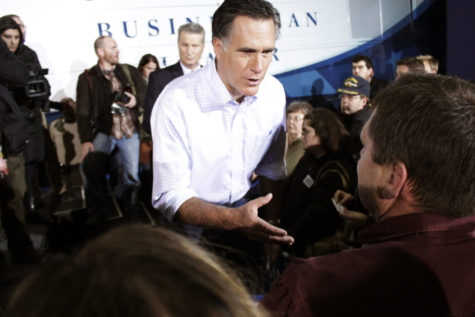Amollo: Cain’s candidacy not an indication of post-racial politics … yet
Photo: Jordan Maurice/Iowa State Daily
Republican presidential candidate Herman Cain speaks to voters in Hiton Coliseum before they cast their ballots in the 2011 Ames Straw Poll.
October 19, 2011
This is not about Herman Cain. It isn’t about the Republican presidential primaries, either.
Like most analysts would contend, Herman Cain does not make a classic subject as far as happy punditry goes. His candidacy and the sudden explosion of his poll ratings does one thing: In the most unexpected way, it brings to fore the question of race and its place in America’s politics.
Cain does not strike one as magical or even substantial. He comes off as a happy Joe lacking the ambitious drive and a compelling winning strategy that would make him an inevitable pick as a person of color. He is a black man running for the highest office in the land, a reality that he seems less bothered with — or rather, that he has chosen to dodge. The numbers so far look good on his side, placing him neck and neck with former Massachusetts Gov. Mitt Romney.
So what do we make of potential “President” Cain? He will be the first black GOP candidate for the presidency; should he win the nomination? Besides earning that coveted historical place, his candidacy will also see him pitted against President Barack Obama — the first black president.
The question worth exploring in the rise of the former CEO of Godfather’s Pizza is his race against the reality of racism in America. More so, Cain’s dalliance with the conservative wing of the Republican Party, the tea party, is quite amazing. It looks more certain that the tea partyers prefer a date with Cain to Romney any hour of the day. He has won their conservative hearts and minds where Romney’s Mormonism and positions, that smell a bit liberal, have disappointed. The question within the question, therefore, is this: Are we less racist than in 2008 when Obama ran for president?
In the 2008 election, President Obama’s race headlined his quest and made the history of a first black president ring louder than our ears had prepared for. On the account of his race, Obama, then a freshman senator from Illinois, was subjected to more media prodding than any other candidate. And while he won the election that year, his “unlikely” candidacy had with it lessons from the American public of how much the question of race needed to be explored. America’s dichotomy bleeds its racial makeup, and there ought to be constant conversations on the question of race in a bid to bury its ugly head in the nation’s dustbin of history.
So far, Cain’s race hasn’t exploded in the primaries. Nothing unseemly has since brought us to think that his blackness is standing in his way. He is the favorite of the conservatives as I write and that suggests that the tea party has few problems with race. If that turns otherwise in the few months ahead, it will be a pity — meanwhile, the devil earns its due. Conservatives standing with Cain, if the poll numbers hold true, are speaking to America. They must be seeing the country’s problems as bigger than an individual’s skin color. And even when Cain’s demise comes to pass as popular media has suggested, history will be kind enough to store Cain’s “favorite candy of the week,” as Sarah Palin has described the candidate. We shall be reminded that race once became a non-issue in the conservative scheme of things.
There may be other factors that merit allusion in trying to understand Herman Cain’s rising star in the conservative galaxy. But at least race has not been scathed. At least there is very little coming from fear politics. And when Cain eventually falters, he will have himself to blame and not the color of his skin. The treatment he has been accorded by the rank and file of the conservative community seems to echo what Dr. Martin Luther King Jr. would offer as a judgment drawing from “the content of one’s character and not the color of his skin.”
A footnote to the conservative love for Cain is that more than anybody else in the primaries, the black candidate will be at odds to prove himself. He has to turn the love into a conviction and present to his believers a blueprint that outsmarts everything that would emanate from his race.
If this had been about Cain, I would have said that he must accept the beyond-the-race love given to him with a toughness that takes this race seriously. I would have told Cain to stop smiling, get serious and start working. I would have told Cain to put together a campaign — a serious campaign (since he has none so far, unless the joke he has presented counts for one). But above all, if I had made this piece about the GOP, then I would have given a big hug to the tea party. I would have congratulated the conservatives for standing above what ails us.
So, assuming that the race lesson from the last election was taken seriously, I want to take the tea party seriously in this regard. I want to assume that the conservatives are no longer scared by race. I want to assume that the tea party is an ideological front where only ideas fry each other and that Cain seems to have ideas that sit well with the movement’s convictions. Should all that be true, then I would commend the tea party. And in commending the tea party, America would win too.









